Kindergarten Registration
Parents/Guardians
Registration is now open!
Trillium Lakelands District School Board (TLDSB) offers both Junior and Senior Kindergarten programs, where our youngest students discover how to learn cooperatively with others. At this age, play is an important way of learning. As children play, they are learning about the world and how it works, about other people, and about themselves.
It is our shared responsibility to ensure that your child’s first school experience will be remembered fondly. We wish you and your child a warm welcome and a future of exciting learning experiences.
To find out which school your child will attend based on your home address, use our School Locator. All contact information for our elementary schools can be found in our School Directory. Each school’s website provides the name of the school’s principal and trustee, school address and contact info, the school’s start and end times, and much more!
Kindergarten package
In kindergarten classrooms, your child will develop a strong foundation for learning in all areas. They will grow through play-based learning and small group instruction with caring educators. Your child will learn about language and math, engage in healthy physical activities and the arts, and develop socially and emotionally through interaction with their peers and educators who guide them.
The evidence is clear – experiences in early childhood have a major impact on future learning, work, health, and social emotional make-up.
Parents/guardians are encouraged to review the information below prior to the first day of school. If you require this information in an accessible format, contact Communications Services at [email protected].
Meet the team
Families + designated early childhood educators + teachers = child’s support team
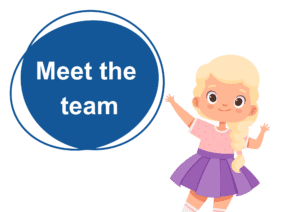 You are your child’s first teacher and will continue to be the source of much of their learning. As your child enters school, we encourage you to speak with their educators, share observations, and ask questions about your child’s progress. Your child’s educators will be assessing your child’s progress frequently, and will use many different strategies to paint a full picture of what and how your child is learning. You and your child’s educators will be using that information to work together to support your child’s progress throughout the year.
You are your child’s first teacher and will continue to be the source of much of their learning. As your child enters school, we encourage you to speak with their educators, share observations, and ask questions about your child’s progress. Your child’s educators will be assessing your child’s progress frequently, and will use many different strategies to paint a full picture of what and how your child is learning. You and your child’s educators will be using that information to work together to support your child’s progress throughout the year.
Don’t forget, we also love to have volunteers in our classrooms!
Playing is learning
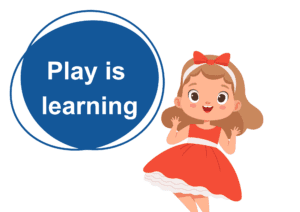 Play is the way children make sense of their world and learn! When children are playing, they are not taking a break. Educators use the curriculum, their knowledge of child development, and the needs of the students to thoughtfully choose materials and plan many different learning opportunities and experiences. In Kindergarten, your child will experience opportunities to learn many skills in literacy, mathematics, and social development through play. When children learn through play they are supported by the educator team who will be listening to, observing, and speaking with children to help them develop and apply their growing skills effectively.
Play is the way children make sense of their world and learn! When children are playing, they are not taking a break. Educators use the curriculum, their knowledge of child development, and the needs of the students to thoughtfully choose materials and plan many different learning opportunities and experiences. In Kindergarten, your child will experience opportunities to learn many skills in literacy, mathematics, and social development through play. When children learn through play they are supported by the educator team who will be listening to, observing, and speaking with children to help them develop and apply their growing skills effectively.
As children learn through play, they are:
- Showing skills they are learning.
- Exploring and investigating the use of carefully chosen materials.
- Building creative thinking and problem-solving skills.
- Watching and learning from one another.
- Learning to talk and listen to contribute ideas.
- Building early reading and writing skills.
- Building math skills such as counting, sorting, and comparing things.
- Practising social skills.
Interested in registering for French Immersion?
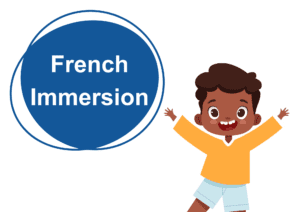
In TLDSB, the French Immersion (FI) program begins in Grade 1.
Families intending to register for FI are welcome to register for Kindergarten at their closest FI school:
- Haliburton: Stuart Baker Elementary School
- City of Kawartha Lakes: Leslie Frost Public School
- Muskoka (South): Monck Public School
- Muskoka (North): Riverside Public School
While the Kindergarten program is not offered in French, registering at the FI school for Kindergarten will allow your child to acclimatize to their school environment before entering FI in Grade 1. In doing so, the FI school becomes the child’s “home school” when registered in the program and transportation is provided. Although it is rare that families decide to leave the FI program, it occasionally happens. If a child withdraws from the program, the “home school” becomes the catchment area school.
Overview of the program
- In Grades 1-6, FI students spend 60 percent of their day speaking and learning in French, and 40 percent of their day in English. Subjects taught in English include math and English literacy. All other subjects are taught in French.
- In Grades 7-8, the program shifts to 50 percent French (French Language, social studies, health and physical education) and 50 percent English (math, English literacy and science)
Getting ready for Kindergarten
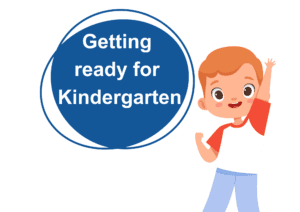 You can help prepare your child for school by:
You can help prepare your child for school by:
Talking with your child
- Ask questions, share opinions, and thoughts
- Tell stories in the car, on walks, or in lines
- Sing the alphabet and other childhood songs, chants, and rhymes
- Practise good listening
Reading together
Before, during, or after reading ask your child:
- “What do you think this book will be about?”
- “What was your favourite part and why?”
- “Can you tell me what happened?”
- “What letters do you see?”
- “What sounds do they make?”
- “Can you count the number of words in the title?”
Exploring numbers and counting
- Count objects
- Work on puzzles, matching activities, memory games, etc
- Building with blocks
- Describe things around you using math language (size, shape, amount)
Playing and writing
- Help your child learn to write their name
- Write lists, notes, and messages together
- Play with magnetic or plastic letters
- Notice that print is all around us! Look for road signs, store signs, and more
Some helpful independent skills to work on at home are:
- Knowing their first and last name
- Understanding and following simple directions
- Asking for help
- Putting on and taking off their coat
- Sharing and taking turns
- Tidying up
- Using the bathroom and washing their hands
- Holding a pencil and cutting paper
- Putting on their shoes and fastening them
The first day of school
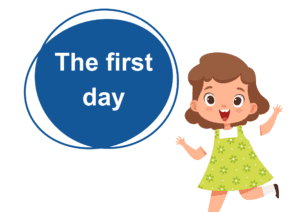 A few days before school begins, start getting your child (and yourself) used to the bedtime and wake-up schedule that school requires. Get everything ready a day or two in advance. Allow your child to choose an outfit they will be comfortable in. Practise walking to the school or bus stop. One day, before school starts, pack a lunch in your child’s lunch box. Let them practise eating lunch from it.
A few days before school begins, start getting your child (and yourself) used to the bedtime and wake-up schedule that school requires. Get everything ready a day or two in advance. Allow your child to choose an outfit they will be comfortable in. Practise walking to the school or bus stop. One day, before school starts, pack a lunch in your child’s lunch box. Let them practise eating lunch from it.
Dress for success
- During the school day, your child will run, jump, sit, walk, and stretch
- Choose clothing that will be comfortable
- Kindergarten children learn best when they can explore, discover, and experiment, so choose clothes that are durable and easy to clean
- Outdoor clothing is required for all types of weather. Choose clothes that your child can put on, take off, and fasten on their own (we don’t want to waste fun time!)
- Label everything with your child’s first name and the first letter of their last name
On the first day!
- Try to keep your morning routine consistent with a calm, unhurried breakfast
- Make your ‘good-bye’ quick, light, and re-assuring (try not to communicate any feelings of anxiety and separation)
- Ensure that your child knows what will happen to them when school is over (who will be picking them up from the school/bus stop)
- Plan a special activity for yourself to help you cope with the temporary sense of loss you might be feeling
School adjustment
Use the first day to start routines that will make the whole school year great. Talk to your child every day about what happened at school, ask questions such as:
- What did you do that you enjoyed today?
- What did your educators read to you?
- What made you happy? Sad? Frustrated?
- Tell me more!
Look in your child’s backpack for their work (another thing to talk about) and school communication.
You may wish to speak with the educators and your child about ways they can choose a quiet activity in the classroom (e.g. reading, listening, or puzzle centre) when their energy gets low. If you have any concerns, you can problem-solve with the educators to support your child.
Stopping the spread of illness
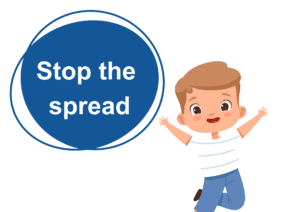 Here are some tips to keep our kids healthy:
Here are some tips to keep our kids healthy:
- Wash your hands often with soap and water
- Cover your cough/sneeze with your upper arm or tissue
- Stay at home if you are sick
School bus safety
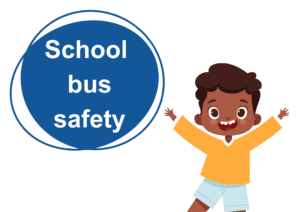 The following tips will help to ensure that your child arrives to and from school safely each day. With your help, we can make our roads and communities a safer place for our kids.
The following tips will help to ensure that your child arrives to and from school safely each day. With your help, we can make our roads and communities a safer place for our kids.
- Look both ways when crossing the street
- Arrive at the bus stop at least five minutes before the bus is scheduled to arrive
- Stand at least five giant steps away from the curb
- Never run after the bus after it has left the stop
- Wait to approach the bus until it has completely stopped
- Stay out of the danger zone
- Never go behind the bus
- Take turns getting on the bus
- Go to your seat and sit quietly
- Keep your hands and body parts inside the bus
Frequently asked questions
Registration for new Kindergarten students typically takes place at the beginning of January, but parents/guardians are welcome to register their children at any time of the year.
Please register your child online. You will then be contacted directly by your child’s school to complete the registration process.
For those who do not have access to internet, please contact your child’s school directly to register your child.
If you do not know which school you should attend please visit mybustoschool.ca and enter your address.
School phone numbers may be found in the Schools Directory.
To register your child in Kindergarten, please have the following items ready:
- Proof of age for each child.
- Name and phone number for family doctor.
- Ontario Health Card number (optional).
- Child’s immunization record.
- Residence road name and 911 address.
The Kindergarten Program is organized into 4 frames:
Belonging and Contributing: which encourages children to build positive self image and to see themselves and others as valuable members of a learning community. This frame helps students learn to add their ideas to the group and accept the ideas of others.
Self-regulation and Well-Being: which supports children in becoming attuned to their own feelings, thinking, and physical and mental wellness as well as those of their peers. This frame helps children build strategies to support them in getting ready to learn.
Problem solving and Innovating: which fosters children’s curiosity and encourages them to question, investigate, create, and test theories as they look closely at the world around them. This frame supports development of these skills in social situations as well as in creative and scientific explorations.
Demonstrating Literacy and Mathematical Behaviours: which provides opportunities for children to explore how letters, sounds, numbers, and other math and literacy concepts work to help them communicate and describe things they experience. This frame supports students in seeing themselves as young readers, writers, communicators and mathematicians.
All of the expectations in the Kindergarten Program are woven through these frames offering your child exciting ways to learn and practice new skills both socially and academically. Your child’s progress and growth in learning will be communicated to you through these frames.
For the most part, play is your child’s homework! But in some instances, and with your support, educators may send home fun activities or games that provide practice or reinforcement of newly learned skills. Watch your child at play; your observations will give you insight into how they prefer to learn. All play – in fact, anything your child is doing – can be a learning experience. Here are some ideas to help you make the most of these opportunities:
- Help develop personal and social skills. (Example: praise and label manners, independent behaviour, good problem-solving . . .).
- Provide opportunities for your child to play with others.
- Encourage sharing and taking turns.
Teach basic safety rules and encourage your child to follow them. - Encourage self-control and acceptance of responsibility. Additionally, finding natural opportunities to practice counting small collections of items (forks for the dinner table, cookies on a baking sheet, eggs left in the carton, etc.) is a great support for many math concepts throughout the school year. Providing your child with fun materials to practice mark making, the beginnings of printing skills, through different activities (painting, chalk drawing, colouring, scribbling/playing with print, sketching, etc.) is a great way to build hand strength and coordination which will help as they begin to learn about kid writing at school.
Your child’s educators will be continuously assessing your child’s progress and will keep you informed. The most important method is through observation – watching and talking with your child. Your child’s educators will use many strategies to assess your child’s learning such as small tasks, assignments and activities. Each strategy gives the educators another part of the picture about how and what your child is learning.
Each child develops in their own way. Young children go through many stages as they grow and learn. One of the things your child’s educators will be considering as part of the assessment is your child’s stage of development. That’s important information to help the educators plan a learning program suited to your child’s needs.
The Ontario Kindergarten Program consists of overall and specific expectations and key understandings that children should develop over two years. These learning expectations represent the first steps in a continuum of programming from Kindergarten to Grade 8.
More information is available at the Ministry of Education website.
The main learning and assessment of your child’s French language skills will happen at school with their teacher. It is not expected that you support French learning directly. In the early grades, students will not have a lot of homework. In those years, celebrating their language skills by listening to them read is a great way to encourage your child in their French language learning. Another great way to support your child is to give them opportunities to listen to French in fun and authentic ways (games, shows/movies – see sites below). As homework time and projects increase over the years, students will be working at their language ability level. Parents can support routines, work habits and maintain communication with the teacher(s).
Please see the two following websites: Radio Canada Jeunesse and TFO.